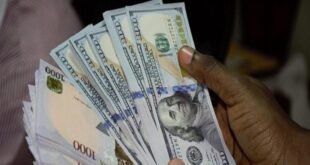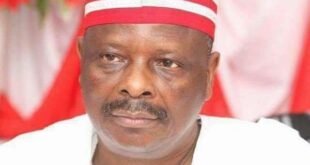Nigeria’s worsening debt crisis has become something of deep concern to everyone. The World Bank and the International Monetary Fund (IMF) are particularly worried about the country’s debt issue.
Nigeria’s debt is deceptively low when measured from gross domestic product (GDP) ratio. While the United States of America (USA), the world’s largest economy, is bogged down with a debt burden amounting to 137 per cent of GDP, Nigeria’s debt is a scant 37.5 per cent of GDP.
The US is indebted to the tune of $31 trillion while Nigeria’s debt just rose to $108 billion in the second quarter of 2023. The GDP of the US is $22 trillion while Nigeria’s GDP is a paltry $501 billion. The two countries’ debts are worlds apart.
Ironically, the magnitude of the debt burden is determined more by the percentage of revenue used to service the debts. America serviced its mountain of debts in 2022 with $1.2 trillion which is about 25 per cent of its revenue.
Conversely, Nigeria serviced its modest debt in 2022 with 93 per cent of revenue. That is why Nigeria’s debt burden is tragically intractable. The burden of debt service is unbearably heavy for Nigeria because of its horrendously low revenue.
The debt burden is lighter for the US even with huge mountain of debts because the world’s largest economy generates sufficient revenue for its services.
The World Bank and IMF trace Nigeria’s debt burden primarily to unmitigated fiscal rascality on the part of the federal government. The federal government lacks the financial discipline to manage loans proceeds.
The fiscal rascality of government is worsened by the level of impunity it enjoys in debt acquisition and management. For instance, the Fiscal Responsibility Act of 2007 provides that governments at all levels can borrow only for “capital investment and human resources development”.
Government treats that provision with irascible impunity. The Act forbids raising loans to pay salaries.
The federal government repeatedly borrows to pay the outrageous salaries of the federal civil service. Worse still, government even borrows to service debt.
The same law prescribes that fiscal deficit for any year’s budget should be pegged at three per cent of GDP. In other words, government should not borrow more than three per cent of the country’s GDP to fund any year’s budget deficit.
The federal government defied the provision of that Act with reprehensible rascality in the 2023 budget. It raised fiscal deficit to 5.03 per cent without batting an eyelid.
In June, 2022, Mrs. Zainab Ahmed, Nigeria’s immediate past minister of finance passively announced that the federal government serviced debt that month with 119 per cent of its revenue.
What could be deciphered from the ignoble announcement is that government borrowed an additional 19 per cent of its revenue to service debts. That amounts to gross defiance of the Fiscal Responsibility Act.
Because no one is mandated to enforce the law, the federal government treats the law with reprehensible contempt.
The problem with the Fiscal Responsibility Act is that its architects drafted it more like a gentleman’s agreement. They expected government to obey the law without being urged.
Ironically, humans are too engrossed in sin to obey any law without someone standing behind them to enforce the law.
There are basic provisions in the Act that are designed to check government’s excesses. The law, for instance, prohibits the lumping of money obtained from loans in government allocation from the federation account.
That provision is designed to ensure the strict use of funds from a loan for the project it was designed.
No one in the federal government opens a different account for money obtained from a loan. It is normally lumped with funds from the federation accounts.
That makes it extremely difficult to monitor the use of funds from any loans obtained by the federal government. Consequently, funds from debts are often diverted even into private pockets without anyone lifting a finger in protest.
Besides, a law that was designed to set restrictions without penalties is more of a gentleman’s agreement.
If the Fiscal Responsibility Act was armed with penalties for anyone breaching its provisions, it would have made the National Assembly the main enforcer of the law.
Under normal circumstances, the president could be impeached if he blatantly disobeys provisions of the law. However, the National Assembly which would have been empowered to impeach the president in the event of blatant defiance of the law is not in position to do that.
The reason is that the nation’s legislature helps the president to disobey the Fiscal Responsibility Act. In the 2023 Appropriation Bill, the presidency allocated N166 billion for the services of the National Assembly during the year.
The National Assembly inauspiciously padded the allocation to N228 billion, thus making it practically impossible for the president to observe the provision of the law restricting annual budget deficit to three per cent of GDP.
What the 469 members of the National Assembly imprudently allocated to themselves is two times the budget of Kogi State which is meant for four million people.
That kind of imprudent legislature has no business encouraging the executive arm of government to observe the Fiscal Responsibility Act meant to compel government to cut its coat according to its cloth.
The National Assembly is part of the reasons that the federal government cannot draw up an Appropriation Bill without borrowing heavily to balance the budget.
Each member of the House of Representatives recently took delivery of a brand new Toyota Land Cruiser limousine for official use. Each of the limousines costs more than N70 million.
A country that spends 93 per cent of its revenue on debt service has no logical reason for such ostentation. Many believe that the indecent ostentation extended to the legislature is designed to lure the lawmakers away from regulating Nigeria’s insatiable thirst for debt acquisition.
The National Assembly has become something of a rubber stamp. It approves all sorts of loan applications without examining the government’s ability to repay the loans.
 JamzNG Latest News, Gist, Entertainment in Nigeria
JamzNG Latest News, Gist, Entertainment in Nigeria









